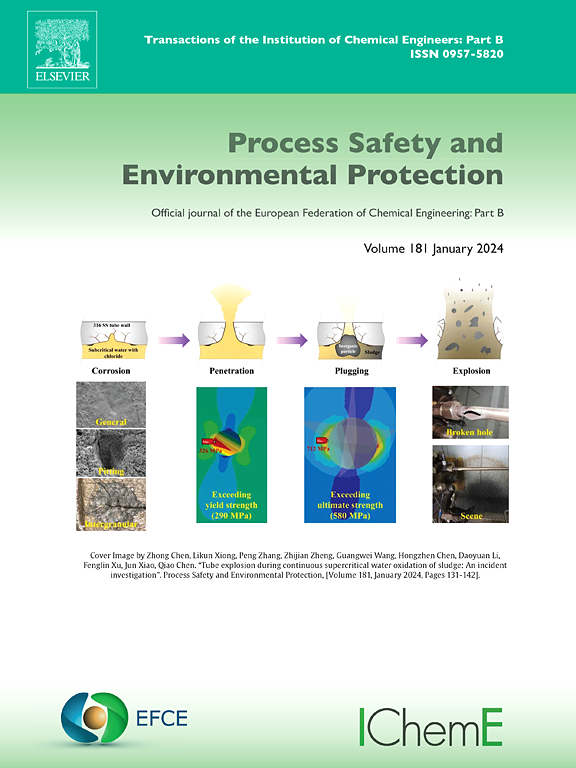塞流运行参数对使用 Fe3O4 纳米流体的直接吸收式太阳能集热器热效率影响的实验研究
IF 6.9
2区 环境科学与生态学
Q1 ENGINEERING, CHEMICAL
引用次数: 0
摘要
本文实验研究了塞流工作参数对使用 Fe3O4 纳米流体(0.05-0.2 wt%)的直接吸收式太阳能集热器(DASC)热效率的影响,DASC 是一种利用高导热率工作流体将太阳光直接转化为热能的装置。因此,液塞长度与管内径之比、空气压缩机工作时间、质量流量、入口温度、太阳辐射和 Fe3O4 纳米流体的浓度都会影响 DASC 的出口温度和效率。与普通流动模式相比,采用塞流模式时,获得和储存的能量明显增加。此外,当 L/D 值为 1.7 时,DASC 的效率最高,比常规流动模式高 27.7%。此外,当使用 0.1 wt% 的 Fe3O4 纳米流体作为塞流模式的工作流体时,直接吸收式太阳能集热器的性能达到最高。本文章由计算机程序翻译,如有差异,请以英文原文为准。
Experimental study on the influence of operating parameters of plug flow on thermal efficiency of direct absorption solar collector with Fe3O4 nanofluid
In this paper, the influence of operating parameters of plug flow on thermal efficiency of direct absorption solar collector (DASC) using Fe3O4 nanofluid (0.05–0.2 wt%) was experimentally studied, the DASC is a device that directly converts sunlight into heat by using a working fluid with high thermal conductivity. As a result, the outlet temperature and efficiency of DASC was affected by the ratio of length of liquid plug to the inner diameter of the tube, the working time of air compressor, the mass flow rate, the inlet temperature, solar radiation and concentration of the Fe3O4 nanofluid. When the plug flow mode was implemented, the energy gained and stored exhibited a notable enhancement compared to the regular flow mode. Furthermore, the DASC exhibited the highest efficiency when the L/D were 1.7 which was 27.7 % higher than that of regular flow mode. In addition, the inlet temperature was inversely proportional to the efficiency cause the heat loss to the environment.The maximum performance of the direct absorption solar collector was obtained when 0.1 wt% Fe3O4 nanofluid was used as the working fluid with plug flow mode.
求助全文
通过发布文献求助,成功后即可免费获取论文全文。
去求助
来源期刊

Process Safety and Environmental Protection
环境科学-工程:化工
CiteScore
11.40
自引率
15.40%
发文量
929
审稿时长
8.0 months
期刊介绍:
The Process Safety and Environmental Protection (PSEP) journal is a leading international publication that focuses on the publication of high-quality, original research papers in the field of engineering, specifically those related to the safety of industrial processes and environmental protection. The journal encourages submissions that present new developments in safety and environmental aspects, particularly those that show how research findings can be applied in process engineering design and practice.
PSEP is particularly interested in research that brings fresh perspectives to established engineering principles, identifies unsolved problems, or suggests directions for future research. The journal also values contributions that push the boundaries of traditional engineering and welcomes multidisciplinary papers.
PSEP's articles are abstracted and indexed by a range of databases and services, which helps to ensure that the journal's research is accessible and recognized in the academic and professional communities. These databases include ANTE, Chemical Abstracts, Chemical Hazards in Industry, Current Contents, Elsevier Engineering Information database, Pascal Francis, Web of Science, Scopus, Engineering Information Database EnCompass LIT (Elsevier), and INSPEC. This wide coverage facilitates the dissemination of the journal's content to a global audience interested in process safety and environmental engineering.
 求助内容:
求助内容: 应助结果提醒方式:
应助结果提醒方式:


